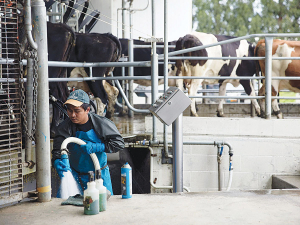State of the Dairy Nation 2024/25: DairyNZ Highlights Record Milk Production and Export Growth
DairyNZ's chief executive Campbell Parker says the 2024/25 dairy season reinforces the importance of the dairy sector to New Zealand.
 DairyNZ says it has suggested the Government take up the option of on-farm self isolation for migrant farm workers amid a lack of MIQ spaces at the border.
DairyNZ says it has suggested the Government take up the option of on-farm self isolation for migrant farm workers amid a lack of MIQ spaces at the border.
DairyNZ says it has put a number of suggestions to the Government about how the sector could manage labour needs and health risks caused by the Covid-19 pandemic.
On-farm isolation is an option, says DairyNZ chief executive Tim Mackle.
"Farms are already away from communities, and farmers are used to maintaining good hygiene standards."
Alongside work to recruit international workers, DairyNZ has a range of initiatives underway to attract Kiwis into dairy, including GoDairy. A new campaign will also soon be launched to give Kiwis a better understanding of what it means to be a dairy farmer.
DairyNZ is also leading the development of a Dairy Workforce Resilience Plan which will involve farmers, dairy companies, sector groups and the Government in creating an evidence-based roadmap to put the sector on a sustainable path to recruit and retain people.
Salaries for people working on dairy farms have increased significantly over the past two years, and many roles offer accommodation on site.
The Meat Industry Association of New Zealand (MIA) today announced that Chief Executive Officer Sirma Karapeeva has resigned from the role.
The winners of the 2026 Hawke’s Bay/Wairarapa Dairy Industry Awards were announced at the annual awards dinner held at Copthorne Solway Park in Masterton on Thursday evening.
Environment Southland is welcoming this week’s decision by the Environmental Protection Authority (EPA) to approve the release of Blaptea elguetai, a leaf‑feeding beetle that will help control the highly invasive Chilean flame creeper.
This March, the potato industry is proudly celebrating International Women’s Day on 8 March alongside the International Year of the Woman Farmer, recognising the vital role women play across every part of the sector — from paddocks and packhouses to research, leadership, and innovation.
Fruit trader Seeka posted a record profit and returns to shareholders in 2025.
Recent weather events in the Bay of Plenty, Gisborne/Tairawhiti, and Canterbury have been declared a medium-scale adverse event.
OPINION: Staying with politics, with less than nine months to go before the general elections, there’s confusion in the Labour…
OPINION: Winston Peters' tirade against the free trade deal stitched with India may not be all political posturing by the…